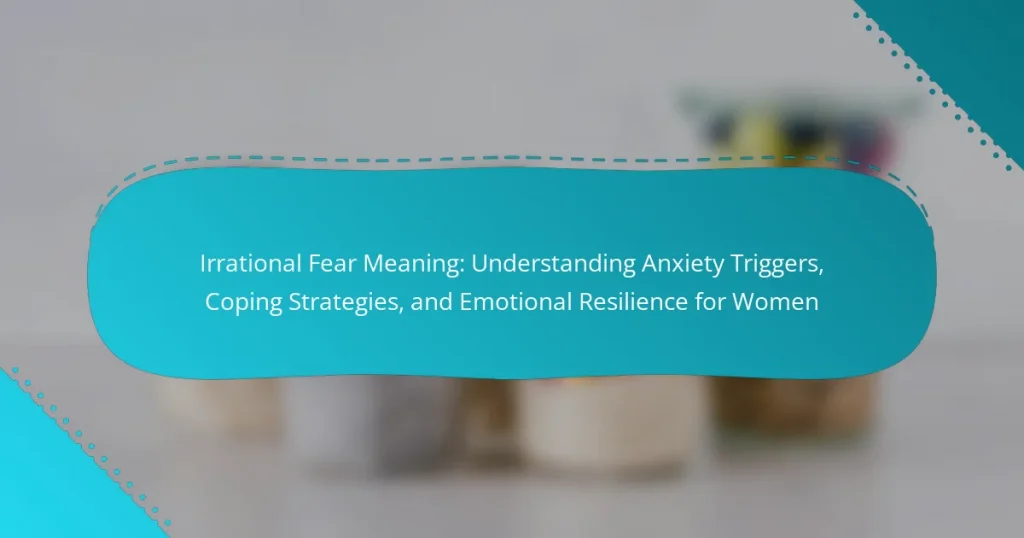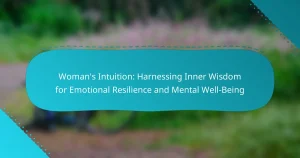Irrational fear can significantly affect women’s mental health and daily lives. Understanding anxiety triggers is essential for developing coping strategies. This article explores effective techniques like mindfulness and cognitive restructuring. It also highlights the importance of social support networks in building emotional resilience.
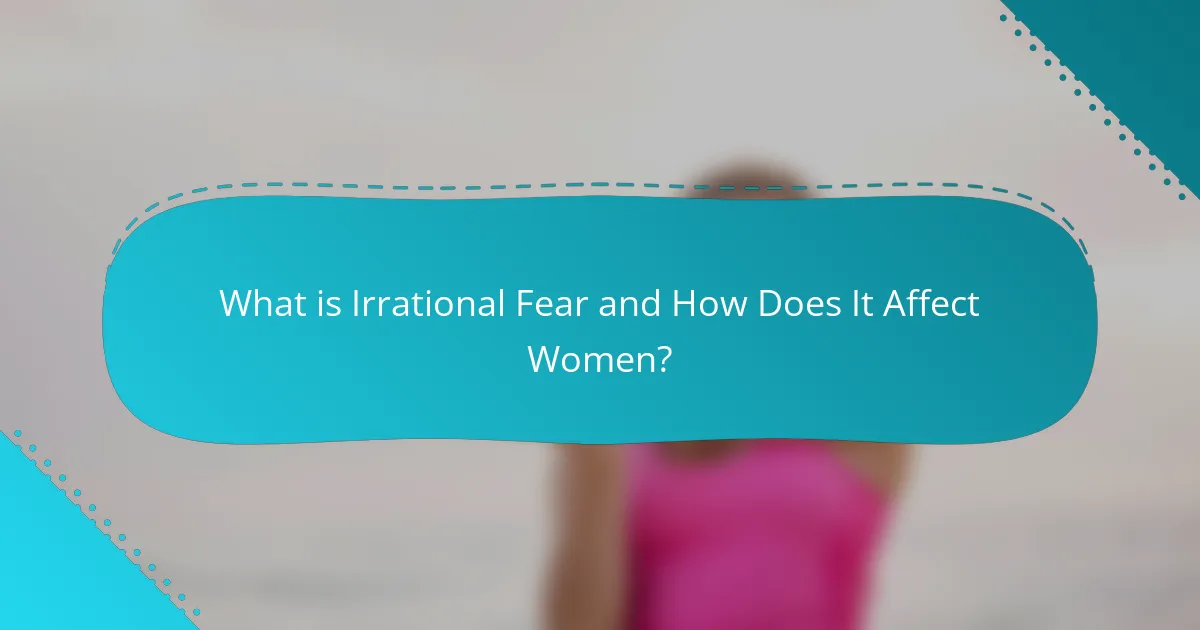
What is Irrational Fear and How Does It Affect Women?
Irrational fear refers to excessive, unwarranted anxiety that can significantly impact women’s mental health and daily lives. This type of fear often stems from past experiences or societal pressures, leading to avoidance behaviors and emotional distress. Understanding the triggers of irrational fear is crucial for developing effective coping strategies. Women can benefit from techniques such as cognitive behavioral therapy, mindfulness practices, and support networks to enhance emotional resilience. These strategies empower women to confront fears and reduce anxiety, ultimately improving their quality of life.
What are Common Anxiety Triggers for Women?
Common anxiety triggers for women include social situations, work-related stress, relationship issues, health concerns, financial pressures, and past trauma. These triggers can lead to irrational fears that impact emotional resilience. Understanding these triggers helps in developing effective coping strategies. For example, mindfulness and cognitive behavioral techniques can mitigate anxiety. Recognizing unique triggers allows women to build stronger emotional resilience and improve mental health.
How Does Hormonal Fluctuation Influence Fear Responses?
Hormonal fluctuations significantly influence fear responses by altering emotional regulation. Changes in estrogen and progesterone levels can heighten anxiety and sensitivity to stressors, particularly in women. Research indicates that these hormonal shifts can intensify feelings of fear during certain phases of the menstrual cycle, affecting coping strategies and emotional resilience. For instance, lower estrogen levels correlate with increased anxiety, making women more susceptible to irrational fears. Addressing these fluctuations through coping strategies like mindfulness and cognitive behavioral techniques can enhance emotional resilience and mitigate fear responses.
What Role Does Societal Pressure Play in Women’s Anxiety?
Societal pressure significantly contributes to women’s anxiety by imposing unrealistic standards. Women often feel compelled to meet societal expectations regarding appearance, career success, and relationships. This pressure can lead to increased stress and feelings of inadequacy, triggering irrational fears.
Coping strategies, such as mindfulness and seeking support, can help mitigate these effects. Emotional resilience plays a crucial role in overcoming anxiety, allowing women to navigate societal pressures more effectively. By fostering self-acceptance and challenging societal norms, women can build a healthier relationship with their anxiety.
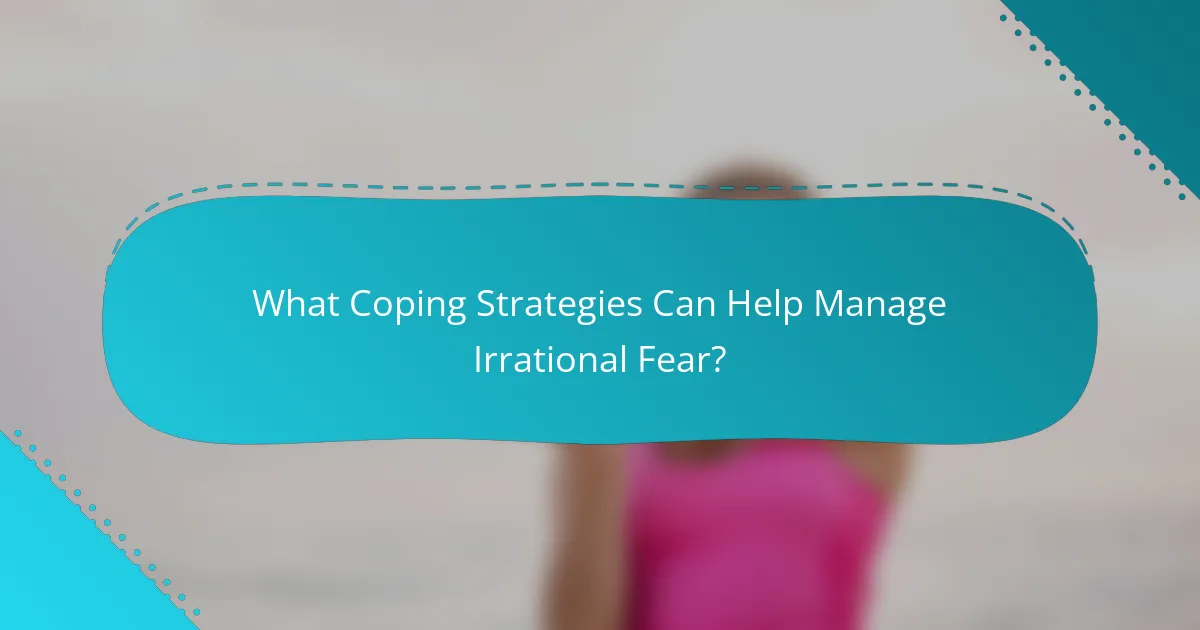
What Coping Strategies Can Help Manage Irrational Fear?
Coping strategies for managing irrational fear include mindfulness, cognitive restructuring, exposure therapy, and building a support network. Mindfulness helps ground individuals in the present, reducing anxiety. Cognitive restructuring involves challenging negative thoughts, fostering a more balanced perspective. Exposure therapy gradually confronts fears, diminishing their power. Lastly, a support network provides emotional resilience through shared experiences and encouragement.
How Can Mindfulness Techniques Reduce Anxiety?
Mindfulness techniques can significantly reduce anxiety by promoting emotional resilience and effective coping strategies. These practices help individuals recognize and manage irrational fears, leading to a decrease in anxiety triggers. Mindfulness encourages present-moment awareness, allowing women to observe their thoughts and feelings without judgment. As a result, they can develop healthier responses to stressors. Studies show that regular mindfulness practice can lower anxiety levels by enhancing emotional regulation and fostering a sense of control over one’s thoughts and feelings.
What Are Effective Breathing Exercises for Immediate Relief?
Effective breathing exercises for immediate relief include deep diaphragmatic breathing, box breathing, and 4-7-8 breathing. These techniques help reduce anxiety and promote relaxation.
Deep diaphragmatic breathing involves inhaling deeply through the nose, allowing the abdomen to expand, and exhaling slowly through the mouth. This exercise can lower heart rate and decrease feelings of panic.
Box breathing consists of inhaling for a count of four, holding for four, exhaling for four, and holding again for four. This structured pattern helps to ground individuals and regain control during moments of anxiety.
4-7-8 breathing requires inhaling for four counts, holding the breath for seven counts, and exhaling for eight counts. This method can quickly calm the nervous system and promote a sense of tranquility.
Incorporating these exercises into daily routines can enhance emotional resilience and provide effective coping strategies for women facing irrational fears.
How Can Journaling Aid in Understanding Fear Triggers?
Journaling can significantly aid in understanding fear triggers by providing a structured way to explore emotions. Writing about fears helps identify patterns and underlying causes, fostering awareness and clarity. This practice allows women to articulate their feelings, leading to improved emotional resilience. Regular reflection through journaling can reveal coping strategies that effectively address anxiety triggers, ultimately promoting mental well-being.
What Should Be Included in a Fear Journal?
A fear journal should include triggers, emotional responses, coping strategies, reflections, and progress tracking. These components help identify patterns and develop emotional resilience.
Triggers: Document specific situations or thoughts that provoke fear.
Emotional Responses: Note feelings experienced during these triggers.
Coping Strategies: List techniques used to manage fear, such as deep breathing or visualization.
Reflections: Write about insights gained from each experience.
Progress Tracking: Record improvements over time to reinforce resilience.
What Role Does Physical Activity Play in Emotional Resilience?
Physical activity significantly enhances emotional resilience by reducing anxiety and improving mood. Regular exercise triggers the release of endorphins, which can mitigate feelings of fear and stress. Women experiencing anxiety can benefit from physical activity as a coping strategy, creating a unique attribute of resilience through movement. Studies indicate that even moderate exercise, such as walking, can lead to improved mental health outcomes. As a result, integrating physical activity into daily routines serves as a practical approach to managing irrational fears and fostering emotional strength.
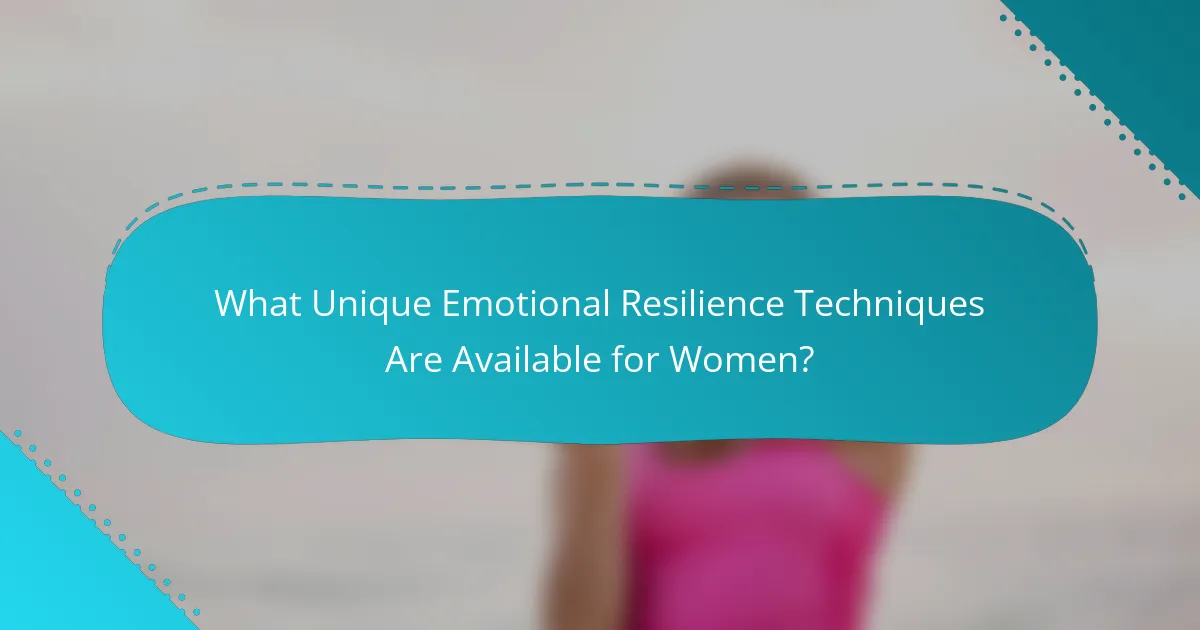
What Unique Emotional Resilience Techniques Are Available for Women?
Unique emotional resilience techniques for women include mindfulness practices, cognitive restructuring, and social support networks. Mindfulness helps women manage anxiety by fostering present-moment awareness. Cognitive restructuring allows women to challenge irrational fears, transforming negative thought patterns into positive affirmations. Social support networks provide emotional validation and shared experiences, enhancing resilience. These techniques empower women to navigate anxiety triggers effectively, promoting overall emotional well-being.
How Can Building a Support Network Help in Overcoming Fear?
Building a support network significantly aids in overcoming fear by providing emotional backing and shared experiences. Supportive relationships foster a sense of belonging, which can reduce anxiety levels. Engaging with others who understand similar fears creates a safe space for expressing feelings. This connection enhances emotional resilience, allowing individuals to confront fears more effectively. Research shows that social support can lower stress hormones and improve coping strategies, ultimately leading to healthier mental well-being.
What Are the Benefits of Professional Counseling?
Professional counseling offers numerous benefits, including improved emotional resilience, effective coping strategies, and enhanced understanding of anxiety triggers. These advantages empower women to manage irrational fears more effectively. Research indicates that counseling can lead to a significant reduction in anxiety symptoms and an increase in overall well-being. Additionally, professional guidance fosters a supportive environment, allowing individuals to explore their feelings and develop healthier thought patterns.

What Rare Attributes Contribute to Women’s Experiences with Irrational Fear?
Certain rare attributes contribute to women’s experiences with irrational fear, including hormonal fluctuations, societal pressures, and unique coping mechanisms. Hormonal changes during menstrual cycles or menopause can intensify anxiety responses. Societal expectations often impose additional stress, leading to heightened fear. Additionally, women may employ distinct coping strategies, such as seeking social support or engaging in mindfulness practices, which can influence their perception of fear. Understanding these rare attributes enhances awareness of how irrational fear manifests in women’s lives.
How Do Cultural Backgrounds Shape Perceptions of Fear?
Cultural backgrounds significantly influence how women perceive and respond to fear. These perceptions are shaped by societal norms, personal experiences, and cultural narratives surrounding anxiety.
For instance, collectivist cultures may emphasize communal support, leading to shared coping strategies among women. In contrast, individualistic cultures often promote personal resilience, affecting emotional responses to fear.
Research indicates that women from different cultural backgrounds may experience unique anxiety triggers. For example, cultural expectations regarding femininity can heighten fear related to safety and social acceptance.
Understanding these dynamics fosters emotional resilience. Women can develop tailored coping strategies that align with their cultural contexts, enhancing their ability to manage irrational fears effectively.
What Unique Coping Mechanisms Are Found in Specific Communities?
Certain communities develop unique coping mechanisms to address irrational fears. For women, these strategies often include communal support, mindfulness practices, and creative expression.
Communal support involves sharing experiences within close-knit groups, fostering understanding and validation. Mindfulness practices, such as meditation and yoga, help women manage anxiety triggers by promoting emotional resilience. Creative expression, through art or writing, serves as an outlet for processing emotions and fears.
These coping mechanisms reflect the values and experiences of specific communities, showcasing the strength found in shared understanding and resilience.
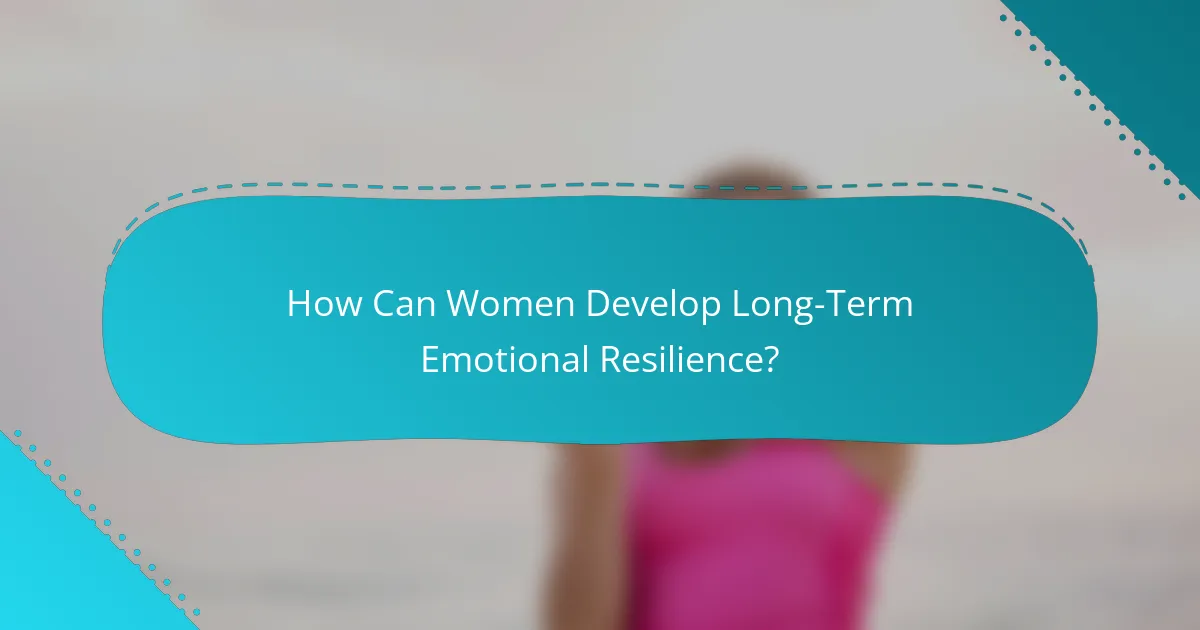
How Can Women Develop Long-Term Emotional Resilience?
Women can develop long-term emotional resilience by recognizing and addressing their irrational fears. Understanding anxiety triggers allows for effective coping strategies. Techniques such as mindfulness, cognitive restructuring, and support networks enhance emotional strength. Regular practice of these strategies fosters a resilient mindset, empowering women to navigate life’s challenges effectively.
What Best Practices Should Women Follow to Maintain Mental Wellness?
To maintain mental wellness, women should prioritize self-care, establish supportive relationships, and practice mindfulness. These strategies help manage irrational fears and enhance emotional resilience. Engaging in regular physical activity can also reduce anxiety triggers. Setting realistic goals fosters a sense of achievement, contributing to overall mental health.
What Common Mistakes Should Be Avoided in Managing Anxiety?
To manage anxiety effectively, avoid common mistakes such as ignoring triggers, neglecting self-care, and relying solely on avoidance strategies. Recognizing irrational fears is crucial for developing emotional resilience. Prioritize coping strategies like mindfulness and seeking support. Emphasizing these aspects helps in building a sustainable approach to anxiety management.
How Can Women Empower Themselves Against Irrational Fear?
Women can empower themselves against irrational fear by developing emotional resilience, identifying anxiety triggers, and employing effective coping strategies. Understanding the root causes of irrational fear enables women to confront and manage their emotions. Techniques such as mindfulness, cognitive restructuring, and support networks can significantly enhance emotional strength. Additionally, engaging in self-care practices fosters a sense of control and reduces anxiety levels. By prioritizing mental health and seeking resources, women can transform fear into a tool for personal growth.
